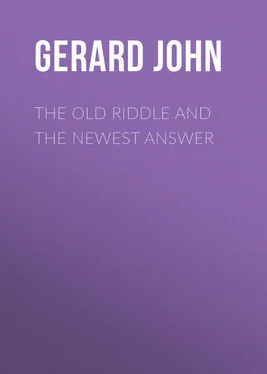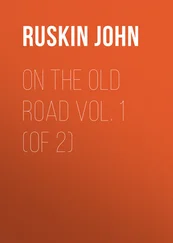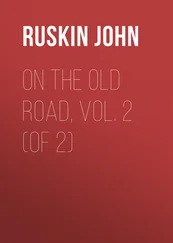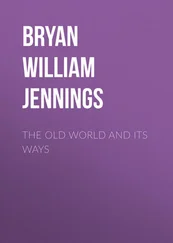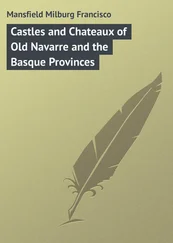John Gerard - The Old Riddle and the Newest Answer
Здесь есть возможность читать онлайн «John Gerard - The Old Riddle and the Newest Answer» — ознакомительный отрывок электронной книги совершенно бесплатно, а после прочтения отрывка купить полную версию. В некоторых случаях можно слушать аудио, скачать через торрент в формате fb2 и присутствует краткое содержание. Жанр: foreign_religion, foreign_antique, foreign_prose, на английском языке. Описание произведения, (предисловие) а так же отзывы посетителей доступны на портале библиотеки ЛибКат.
- Название:The Old Riddle and the Newest Answer
- Автор:
- Жанр:
- Год:неизвестен
- ISBN:нет данных
- Рейтинг книги:4 / 5. Голосов: 1
-
Избранное:Добавить в избранное
- Отзывы:
-
Ваша оценка:
- 80
- 1
- 2
- 3
- 4
- 5
The Old Riddle and the Newest Answer: краткое содержание, описание и аннотация
Предлагаем к чтению аннотацию, описание, краткое содержание или предисловие (зависит от того, что написал сам автор книги «The Old Riddle and the Newest Answer»). Если вы не нашли необходимую информацию о книге — напишите в комментариях, мы постараемся отыскать её.
The Old Riddle and the Newest Answer — читать онлайн ознакомительный отрывок
Ниже представлен текст книги, разбитый по страницам. Система сохранения места последней прочитанной страницы, позволяет с удобством читать онлайн бесплатно книгу «The Old Riddle and the Newest Answer», без необходимости каждый раз заново искать на чём Вы остановились. Поставьте закладку, и сможете в любой момент перейти на страницу, на которой закончили чтение.
Интервал:
Закладка:
I make bold to affirm that the deeper Science penetrates into the secrets of organization and phenomena, the more does she demonstrate how wide and how profound is the abyss which separates brute matter from living things.
The other point requiring notice is crystallization. Inorganic matter, as we know, can build up crystals, the wonderful structure of which results from the molecular properties of the substance crystallized. Why then, some would ask, may not matter in the same manner produce Protoplasm?
But, in the first place, this, as we have heard, is what it is never found to do. Crystals we can produce at pleasure, in what quantity we will. But all efforts have not yet succeeded in obtaining the most minute speck of living matter. Moreover, nothing can be more widely different from organic structures than crystals. The latter are always mathematical, the former never: the latter grow by outside accretion, of the one kind of particles whereof they consist: the former by absorption and assimilation of various foreign substances: the latter are wholly independent of anything like an ancestor: for the former an ancestor is in our experience indispensable: crystals can be dissolved and recrystallized: living matter once destroyed can never be reconstituted. Above all, the particles incorporated in the crystal are absolutely quiescent, so far as any portion of matter can be said to be so, no more able to change their position without external force than the bricks in a wall, while those in living tissue at once become subject to "the whirlwind of life," involving constant change the cessation of which is death.
It is inexplicable to me [says M. de Quatrefages] 103 103 Op. cit. ii. 63.
that some men whose merits I otherwise acknowledge, should have compared crystals to the simplest living forms… These forms are the antipodes of the crystal from every point of view.
To the same effect speaks Mr. A. R. Wallace, Mr. Darwin's associate in the discovery of the Darwinian theory. In a work expressly devoted to the vindication of that theory, Mr. Wallace declares that far from the way of evolution being made clear by Science from end to end – "there are at least three stages in the development of the organic world where some new cause or power must necessarily have come into action." And at the head of them he places that which we are now considering, writing thus: 104 104 Darwinism , p. 474.
The first stage is the change from inorganic to organic, when the earliest vegetable cell, or the living protoplasm out of which it arose, first appeared… There is in this something quite beyond and apart from chemical changes however complex; and it has been well said that the first vegetable cell was a new thing in the world, possessing altogether new powers… 105 105 The other stages presenting similar difficulties are the 5th and 6th of Du Bois-Reymond's Enigmas, viz. the introduction of sensation or consciousness (animal life), and of rational thought and speech.
Such testimonies are sufficient for our present purpose. In face of them it cannot be pretended that Science knows anything of spontaneous generation or gives her verdict in its favour. On the contrary, as Professor Tait declares: 106 106 Contemporary Review , January, 1878, p. 298.
To say that even the very lowest form of life, not to speak of its higher forms, still less of volition and consciousness, can be fully explained on physical principles alone, … is simply unscientific. There is absolutely nothing known in physical science which can lend the slightest support to such an idea… To suppose that life, even in its lowest form, is wholly material, involves either a denial of the truth of Newton's laws of motion, or an erroneous use of the term "Matter." Both are alike unscientific.
Yet it is precisely in the name of Science that we have been told to accept the spontaneous origin of life from inorganic matter, as a clearly demonstrated truth, and no riddle at all.
But as Professor Virchow, Evolutionist and Materialist as he was, well said in regard of this very point in the Munich Congress of 1877:
If we would speak frankly, we must admit that naturalists may well have some little sympathy for the generatio aequivoca [spontaneous generation]. If it were capable of proof, it would indeed be beautiful! But, we must acknowledge, it has not yet been proved. The proofs of it are still wanting… Whoever recalls to mind the lamentable failure of all the attempts to discover a decided support for the generatio aequivoca in the lower forms of transition from the inorganic to the organic world, will feel it doubly serious to demand that this theory, so utterly discredited, should be in any way accepted as the basis of all our views of life.
X
ANIMAL AND MAN
LEAVING for later consideration the fourth of Du Bois-Reymond's Unsolved Enigmas, namely the seemingly pre-ordained order of the universe, we may conveniently group together the three which follow it, as much resembling that which has just occupied our attention. These problems, it will be remembered, are ( a ) the origin of simple sensation and consciousness, or, in other words, of the faculties possessed by animals; ( b ) that of rational thought and speech; ( c ) Free-will. – Here again we are bound to ask, in the name of right reason and common-sense, what light has really been thrown on such questions by Science, and how far she has changed their aspect, – that so we may guard against the delusion of imagining ourselves to be in possession of more knowledge than we actually possess.
( a ) Simple sensation and consciousness. As regards the actual origin of the higher form of life which distinguishes the animal from the vegetable, we are obviously no better informed than we have found ourselves to be concerning the first beginnings of life in any form, – no evidence as to the actual facts being available, or even possible, for our enlightenment. Once more we can only argue from the present to the past, and enquire whether the progress of science has made it more reasonable to suppose than it seemed in pre-scientific days that animal life has been spontaneously evolved, either from inanimate matter or from the vegetative life of plants. This enquiry so much resembles that which we have just concluded as to make it unnecessary to pursue it at any length.
We find, in fact, that men of Science who have no prepossessions whatever against Evolution, and would willingly accept the Law of Continuity at all points, if only evidence were forthcoming, find here not only an unsolved problem, but one even more difficult than the Origin of Life itself. Du Bois-Reymond for example places this amongst his "transcendental" enigmas, to which an answer will never be found, whereas he thinks that the origin of vegetable life, although at present a mystery, may one day be explained. The expression of his opinion, – that by no possibility can we ever understand how consciousness could be evolved from matter – has, he tells us 107 107 Die sieben Welträthsel , D. 82.
been vehemently contradicted, but, he adds, nothing in the way of argument, or beyond mere assumptions, has been brought against him. Of these assumptions he notices only that of Professor Haeckel, "the Prophet of Jena," who protests against such limitations of our possibilities as treason to the sacred cause of Evolution. The progress we have made in intellect, says Haeckel, beyond our barbarous progenitors, is sufficient to show that we are on the high road of development towards a stage as far in advance of the present, as this is of the past; and when that is attained, our knowledge will be full and will embrace all this. But, asks Du Bois-Reymond in reply, is this mighty progress of ours so very evident within the period concerning which we have any information? Has the mental capacity of our race notably improved since Homer? 108 108 Professor Huxley, it must be remarked, speaks of Homer as a "half savage Greek" ( Lay Sermons , p. 12), and intimates a mild wonder that such a being could share our feelings in presence of nature to so large an extent as his poems testify. This is undoubtedly a fine example of the good conceit of ourselves which the pursuit of science is rather apt to produce.
or its faculty of thinking since Plato and Aristotle? At our present rate of progress, long before the high-water mark prophesied by Haeckel is reached, the earth will have become uninhabitable. And, were it otherwise, the highest point of intellect to which conceivably man could attain, would be that of the "sufficient intelligence" whereof we have been told, which, from an inspection of the cosmic nebula could foretell all that was to issue from it. And, adds Du Bois-Reymond, even could we do this, we should still be unable to understand the origin of consciousness, which would require intelligence of another order than ours, however magnified.
Интервал:
Закладка:
Похожие книги на «The Old Riddle and the Newest Answer»
Представляем Вашему вниманию похожие книги на «The Old Riddle and the Newest Answer» списком для выбора. Мы отобрали схожую по названию и смыслу литературу в надежде предоставить читателям больше вариантов отыскать новые, интересные, ещё непрочитанные произведения.
Обсуждение, отзывы о книге «The Old Riddle and the Newest Answer» и просто собственные мнения читателей. Оставьте ваши комментарии, напишите, что Вы думаете о произведении, его смысле или главных героях. Укажите что конкретно понравилось, а что нет, и почему Вы так считаете.
